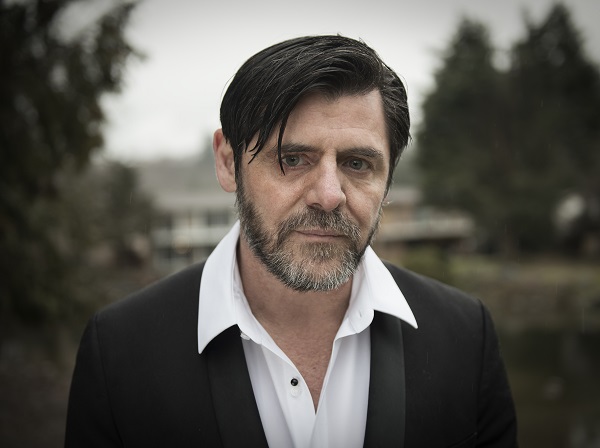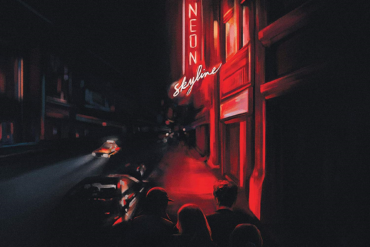Once I’d heard Rodney DeCroo’s forthcoming album, “Old Tenement Man,” I absolutely could not get it out of my mind. Songs like “I’ve Got a Mirror, I’ve Got a Gun” (exploring how pain can turn into art, sometimes in unhealthy ways) and “The Barrel Has a Dark Eye” (in which DeCroo asks whether we really know who the enemy is in this day and age) have become frequent earworms in my head, and for good reason – this is a powerful set of songs, from a terrifically talented songwriter.
Rodney DeCroo has built a significant discography since his 2004 debut album, even with a hiatus from music beginning in 2010 that resulted in a book of poetry, a spoken-word album, and a one-man theatre show. These multiple creative outlets have provided him with the means to work out a number of personal demons, but it’s clear from this album that he still has much more to say, and do.
Rodney was kind enough to talk to us recently about “Old Tenement Man.”
Your previous album, “Campfires on the Moon,” was primarily acoustic in nature – this project starts off with a bang with the first track, “Jack Taylor,” and doesn’t ever let up in intensity. Was this guided by the songs you decided to include in the record, or did you start work on this album thinking you wanted a different sound for this project?
Everything I do musically starts with the simple act of me sitting down with my guitar searching for a chord pattern or a lyric that grabs me. Once I have that I literally build the song one line at a time. I play the first line and play it fifty times if necessary until the next line comes to me and so on until the song says it’s done. I don’t know what I’m going to write about before I write it. It’s always a process of discovery for me. I think I discover my songs rather than write them. When I do try to write a song intentionally about a subject the song is invariably a bad song.
Anyhow, as I write songs they’ll pile up and I’ll start choosing songs for the next album and discarding others. I’ll make Garage Band acoustic recordings and make demo albums for myself. Gradually I’ll boil it down to 10 to 12 songs. Throughout the process I’ll have ideas about which musicians I want to make the record with, what instrumentation, who will produce and slowly I start to put those ideas into motion. But it’s all really just listening for me, listening to what my gut, my heart, my intuition is telling me. And then you know, it comes together and I lay out my ideas and the other people involved give me their opinions and gradually we decide where we’re going which is nearly always both far and near from my original ideas. So, no, I didn’t know what kind of record I was going to make until well into the process. And even though Lorrie and I discussed it at length, what happened in the studio was different from what I that it was going to be and that’s what I hoped would happen.

One of the lines that struck me the most from the album is in “I’ve Got a Mirror, I’ve Got a Gun”: “Is it murder, is it art / What I do to my heart / I can’t tell them apart.” It occurs to me that we often do so much harm to ourselves in the name of ‘self-improvement,’ or ‘fixing what’s broken,’ or being who others expect us to be… the person in this song’s story is really undecided about how it will end, whether it’s murder or art. Is this a story that you’ve seen played out often around you?
I hate to sound morbid here, but honestly, I’ve been a deeply self-destructive person throughout my life. I nearly died several times due to alcohol and drug problems. I’m a lot better now and songwriting, recording and performing has helped me. I guess creativity is the mirror – addiction, self-harming, suicidal ideation, etc., are the gun. Or is the process of art making the gun as well in the end? I’m fanatically obsessed with writing poems and songs and as much as it helps me it’s also put in me in bad places. I used to really tear the shit out of my life, just burn it to the ground and then go write a record. I stopped doing that it seems, I’ve found other ways to be creative, but the truth is, there are things in me, you know the trauma of my early childhood, that might ultimately take me down. I honestly don’t know. I’ve been through soul crushing bouts of depression and the PTSD and addiction have cycled way out of control at times. Maybe the creative stuff won’t be enough at some point. Or maybe I’ll continue to get control around those destructive impulses. I’ve been doing well for several years now. There are people that care about me and that I care about. I don’t want to ruin that. As far as your question goes, I really don’t know. I’ve found things that have helped me and other things that were supposed to help and they harmed me. Every person is so different. I can’t presume to speak about what goes on for other people.
During your career, you’ve found multiple outlets for your creativity – music, poetry, theatre. Do you find them to be facets of the same inspirational source, or are they completely different ways to express yourself?
They all come from the same sources for me, but they’re different forms of expression, though they share many commonalities too. I don’t think a well written song is much different in its impact on a person than a well written poem for example. Ultimately they’re all forms of storytelling.
In your bio, you say this: “Those album characters reflect the resentful parts of myself that were killing me. I wanted to write them out, so I could lay them to rest.” Do you feel as though you’ve mostly laid the ‘resentful parts’ to rest, or will you continue writing them out in future albums? (Do we ever really rid ourselves completely of our resentful parts?)
Yeah, I guess they’re more like potential selves that arise out of resentment, self pity, cynicism, fear, profound self centeredness and so on. I could be that reactionary white guy ranting about minorities or how the liberal media has destroyed his life, I could’ve been the type of guy to use violence to get some pay back for my grievances real and imaginary, I could be a bitter, mean, old, drunk, burnt out gangster fantasizing about the apocalypse as I lose my mind. There’s a line in a B.H. Fairchild poem where he says about a character who has done a horrible thing
“and he cries out / I am a zero, but you think no, no it’s worse,
you’re a man.”
Meaning of course that humans are capable of all kinds of things – some good, some not so good and some really evil shit too.
So, I wanted to get those potentialities in myself out into the open in my songs. I’ve got a decent mind, I’ve got a lot of support, I’ve received much love and compassion, so I’ve been able to recognize things in myself and not to give into them, but I still wanted to put them into characters, to get to know them in a detached way, to make friends with them as someone who helped me a lot used to say, make friends with your fears, your shadow self, get to know them. Yeah, I don’t think I can ever say oh yeah these elements don’t exist in me anymore, but if I continue to live, relate, act in certain ways their hold on me gets less and less.
I’m often curious about how artists choose their album art. How do you feel the cover picture for the album reflects what you’re trying to say in the songs?
I’d really like to say something clever here, but the truth is I love working with artists I admire and that I work well with. Rebecca Blissett is a photographer that I have enormous respect for and she’s fun, but she also doesn’t fuck around, she’s there to work and I love that. I also like involving my friends, people who are a part of my life in that process. So, I hire Rebecca to work with me to come up with intuitive ideas for shooting and then she takes great photos of me with friends and people who are important to me in some way. Then we choose the one we like best for the cover. That’s really all that it is. I don’t get very cerebral about it.
In your bio, you also mention that those album characters reflect some of the personalities currently front and center in our collective consciousness. We have a political climate down here (we’re based in central Pennsylvania) where the people currently in power do not reflect our best selves – at least, I hope they don’t. How do we counteract that for our young people in particular?
I’m from just outside of Pittsburgh and lived through the Reagan era in PA through my childhood. People really chose fear and reactionary politics over progressive values at that time. I can’t say what we should do. I mean, I don’t really know the answer to that question. I can say that I’m a political creature. But politics are like opinions, they often pretty hollow unless we live them in some way, Nothing has ever impacted me more in my life than the people who are consistently and genuinely compassionate, accountable, giving and loving. I really like Dr. Cornel West. He says our politics/activism have to be based in love.
You have a number of concert dates already on your schedule for this summer, and I believe your next volume of poetry is also coming out later this year (I believe the release date is August here in the US) – what else is on your docket for the next several months?
ME: Well the album is coming out and I’m touring lots over the next few months in Canada and then Europe in the fall. I’m going to Edmonton to make a music video with Eden Munro for the song Like Jacob When He Felt The Angel’s Touch. I have a new collection of poems called Next Door to the Butcher Shop coming out with Nightwood Editions at the same time as my album with Tonic Records. We’re having a big book/ album release show at The Cultch on May 31 in Vancouver and Geoff Berner is going to play as well which I’m excited about. And I’m working with my friend Jonathan Orr who is producing / composing the music for another collection of poem songs (poems set to music). The final project is an album of Appalachian songs that I’ve re-interpreted called the Devil’s Brother. Rob Malowany, who produced my poetry album Allegheny is working with me on that project.
~ L
Photo credit: Rebecca Blissett
“Old Tenement Man” releases on 5 May – visit Tonic Records’ website to order it when it comes out.


